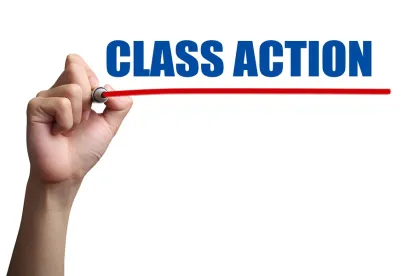In re Daily Fantasy Sports Litig., 2019 U.S. Dist. LEXIS 206689 (D. Mass., Nov. 27, 2019)
Court enforces arbitration agreement formed on the internet, but requires direct benefit for non-parties to be bound.
This decision involved the enforceability of arbitration agreements formed online. Plaintiffs were (i) users of the DraftKings and FanDuel websites, (ii) so-called “cross-over” plaintiffs, users asserting claims against the other website for allowing their employees to play, and (iii) family members of the website user plaintiffs who sought to recover for gambling losses.
The issue before the district court was defendants’ motions to compel arbitration. Although the process of agreeing to arbitration differed on the DraftKings and FanDuel websites, the court concluded that the user plaintiffs entered into enforceable arbitration agreements. Specifically, to use the DraftKings website, users had to check a box labeled “I agree” that appeared directly adjacent to the “Terms of Use” containing the arbitration agreement. When using the FanDuel website, assent to the “Terms of Service” was displayed in a four-line block of text below the “Play Now” button, and the court concluded that any reasonable user would notice the disclosure. The district court noted that “the question at hand is not whether the site was optimally designed, but whether a player had actual or constructive notice that there were terms requiring his assent to which he did give assent.” Finding that players had reasonable notice, the court noted that it was “highly implausible” that FanDuel users, unlike “a randomized population of potential purchasers of a common consumer product being marketed over the Internet[,]” were “actually puzzled or fooled by the FanDuel sign-in screen.”
The district court thus granted defendants’ motions to compel arbitration as to the user plaintiffs and cross-over plaintiffs, concluding that arbitration was warranted as to the cross-over plaintiffs because their claims were intertwined with the users’ claims, and they were estopped from denying the arbitration clause. The district court refused to allow those plaintiffs to arbitrate and litigate the same claims.
The district court, however, came to a different conclusion as to the family members. Those plaintiffs did not agree to arbitrate, and defendants had not presented any evidence that they received a direct benefit from the agreement. As a result, the family members could bring their distinct state-law claims (which are based on the same set of operative facts) in the judicial forum.
Jackie 888, Inc. v. Tokai Pharms., Inc., 2019 Mass. Super. LEXIS 1206 (Nov. 25, 2019)
State court refuses to certify nationwide class because it lacked personal jurisdiction as to the claims of nonresidents.
In this putative securities class action arising out of an initial public offering of defendant’s stock, plaintiff alleged that defendant made misleading statements in its registration statement and prospectus concerning efforts to develop the drug Galeterone, which is used to treat prostate cancer.
The superior court, in denying plaintiff’s motion for class certification, addressed whether a Massachusetts state court could certify a nationwide class and exercise personal jurisdiction over out-of-state plaintiffs where Massachusetts Rule of Civil Procedure 23 does not allow absent class members to “opt out.” Because absent class members had no contact with Massachusetts – beyond agents in other states purchasing defendant’s stock – the superior court found that certifying a nationwide class was not consistent with due process. Specifically, according to the decision in Moelis v. Berkshire Life Ins. Co., 41 Mass, 482 (2008), without the right to opt out, a Massachusetts court could only assert personal jurisdiction (and certify a nationwide class action) if those plaintiffs satisfied the traditional “minimum contacts” test for personal jurisdiction, which they did not.
Walker v. Osterman Propane LLC, 2019 U.S. Dist. LEXIS 181626 (D. Mass. Oct. 21, 2019)
Court certifies putative state Wage Act class based on evidence of company-wide training that may have violated employees’ rights to meal breaks.
Plaintiff brought this putative class action under the Massachusetts Wage Act, Mass. Gen. Laws ch. 149, § 148, alleging that defendant failed to pay its propane delivery drivers during their lunch breaks because (i) their breaks were deducted from their hours automatically even though the defendant knew they did not take breaks, and (ii) they were not relieved of all their duties during their breaks. The district court certified a class under Rule 23(b)(3) as to the plaintiff’s second theory of liability, but not the first.
As to the first theory of liability (automatic deductions), the district court concluded that the class was ascertainable and numerosity was met (based on there being over 100 putative class members, noting the oft-cited example of having more than 40 class members to satisfy numerosity). Plaintiff, however, had not shown that there was a company-wide automatic deduction policy and, as such, could not satisfy commonality or predominance considering the individual inquiries needed to determine Wage Act liability and damages.
As to the second theory of liability (work-related duties imposed during break), the court came to the opposite conclusion. Plaintiff based the theory on the allegation that certain safety restrictions/training required delivery drivers to stay within a specific distance of their trucks during breaks. That created a common question of fact (whether drivers were trained to stay within a specific distance) and one of law (whether drivers are relieved of work duties if they are subject to the distance restrictions) that satisfied commonality. The district court further found that those common questions predominated even though individual issues of damages would remain, as such damages could be derived from defendant’s records. The district court concluded that typicality was met (as all drivers are required to take the subject safety training), and that proceeding as a class action was superior to individual actions.
Pimentel v. City of Methuen, 2019 U.S. Dist. LEXIS 211512 (D. Mass. Dec. 9, 2019)
Court refuses to certify class because of individual inquiries required to determine if class members were injured by erroneous “advice of rights” form used by state municipal police department.
This case involved a putative class action alleging civil rights violations arising out of an incorrectly worded “advice of rights” form used by the Methuen Police Department before a driver’s consent to take (or not take) a breathalyzer test. Although there was no question that the form (written in Spanish) contained “troublesome” mistakes, the district court denied plaintiff’s motion for class certification.
The district court concluded that a putative class was ascertainable, but found that plaintiff had not met her burden to prove commonality, typicality or any of the prongs of Rule 23(b). The district court also questioned whether plaintiff had satisfied the numerosity requirement because plaintiff had identified fewer than 40 putative class members; however, the court declined to rule on this issue because of the other infirmities in the proposed class.
As to commonality, the court held that mere receipt of the erroneous form did not cause a cognizable injury, as Massachusetts “OUI” law only requires “actual consent” as opposed to “informed consent.” For the incorrect form to have any cognizable impact, a person would have to read it (or have it read to them) and have relied on it in some detrimental way. Therefore, whether an individual received the form did not present a common question on which liability or damages turned.
In re Intuniv Antitrust Litig., 2019 U.S. Dist. LEXIS 162792 (D. Mass. Sep. 24, 2019)
Court certifies direct purchase class alleging anticompetitive conduct between drug manufacturers.
Direct purchasers of the branded and generic drug Intuniv brought this putative class action alleging that branded and generic drug manufacturers engaged in an anticompetitive patent infringement settlement. Plaintiffs claimed the settlement was an unlawful “pay-for-delay” settlement, allowing the brand manufacturer to launch a generic version of the drug through an affiliate. The district court granted in part and denied in part plaintiffs’ motion for class certification.
The district court found the class ascertainable and sufficiently numerous, as it consisted of 48 direct purchaser entities that were geographically dispersed such that joinder was impracticable. The district court cited the general rule that 40 or more class members generally satisfies numerosity. As for commonality, the district court concluded that common questions included whether defendants maintained a monopoly and whether the settlement agreement constituted an unfair restraint of trade. Typicality was met because the antitrust claims arose from the same alleged conduct.
The court concluded that one plaintiff (FWK) had not shown it was an adequate class representative because it was an investment vehicle created by one of the proposed class counsel, and neither class counsel nor his business partner had any experience in the drug industry. The close business relationship between FWK and class counsel and lack of supervision of the case by FWK also impacted the adequacy analysis. The district court, however, concluded that the other plaintiff (RDC) was adequate, noting that it was a “close call” because, although RDC was a regional drug wholesaler, RDC’s prior management had engaged in regulatory violations and potential criminal conduct (unrelated to the litigation). As RDC was under new management, and its conduct, in this case, had seemed conscientious, the district court concluded that RDC could serve as a class representative.
Finally, as to predominance and superiority, the district court found that there were significant common issues of fact and law bearing on liability and damages, and that most of the evidence at trial would concern whether defendants engaged in anticompetitive conduct and its impact on the marketplace. Although there was contradictory expert damages testimony, the district court certified a class because it concluded that all it needed to do at the class certification phase is determine that plaintiff’s expert’s methodology was consistent with defendants’ alleged unlawful conduct in delaying the launch of a generic drug during a specific period of time.
Please see news from other circuits here: Class Action Litigation Newsletter | Winter 2019/2020




 />i
/>i
